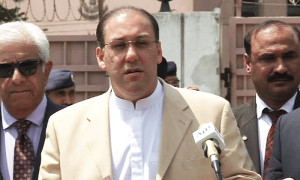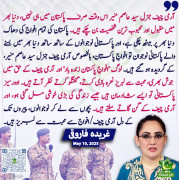Knownajnabee
Minister (2k+ posts)
ISLAMABAD: Annual inflation edged up to 2.7 per cent in November 2015, a sharp rise compared to 1.6pc in the preceding month, on the back of increase in prices of perishable products.
The Consumer Price Index (CPI), the indicator which is used to measure prices of 481 commodities every month, rose by 0.6pc year-on-year in November, the Pakistan Bureau of Statistics (PBS) said on Tuesday.
Prices of perishable products increased by 3.71pc in November 2015 compared to the previous month. Additional upward pressure came from hike in prices of clothing and footwear, housing, water, electricity, gas and fuel, health and furnishing equipment.
Average inflation for July to November now stands at 1.87pc
Though inflation is contained, market prices of certain consumer items like tea, milk and meat are said to be on the rise. The government has introduced Rs40bn new taxes on import of processed food and other products, and their prices are expected to increase in the next few months.
Analysts believe one reason behind low inflation is governments stabilisation plan under the International Monetary Funds (IMF) programme.
Core inflation, measured by excluding volatile food and energy prices, was recorded at 4pc in November 2015, slightly up from 3.4pc in the previous month. Falling inflation has also encouraged the State Bank of Pakistan to maintain its key interest rate at a 42-year low of 6.5pc.
Core inflation has remained subdued since November last year because of a tighter monetary policy and reduction in food and fuel prices. In November 2015, food inflation stood at 2.2pc, mainly due to perishable items. However, prices of non-perishable items rose by 0.28pc.
Food items whose prices increased included chicken (21.13pc), tomatoes (18.12pc), onions (14.61pc), potatoes (12.82 pc), eggs (10.68pc), besan (3.69pc), vegetables (3.26pc), tea (3.14pc), mash pulse (2.90pc), pulse gram (2.51pc), fish (2.39pc), betel leaves (1.88pc) and wheat flour (1.46pc).
Non-food inflation stood at 3.2pc. Price of woollen readymade garments rose by 2.52pc, motor fuel by 1.99pc, doctor fee 1.21pc and kerosene 1.11pc.
Average inflation measured through the Sensitive Price Index (SPI) was negative 0.27pc in July-November 2015, while Wholesale Price Index (WPI) was negative 2.73pc.
Lower WPI reflects less demand for domestic commodities, mainly because of low purchasing power. The entrance of manufacturing sector into a negative growth indicates deflation in the economy.
Published in Dawn, December 2nd, 2015
- Featured Thumbs
- http://oly.com.pk/wp-content/uploads/2015/03/inflation.jpg
Last edited by a moderator:

































